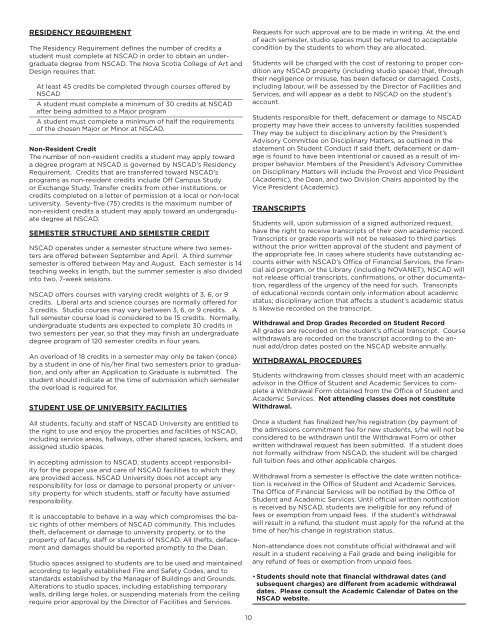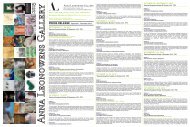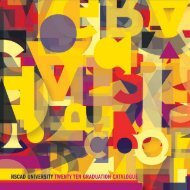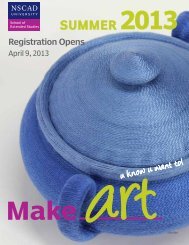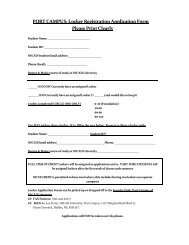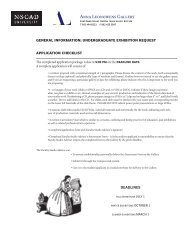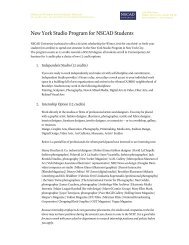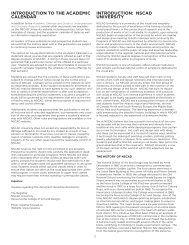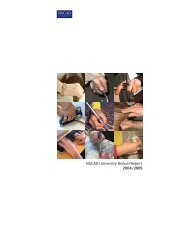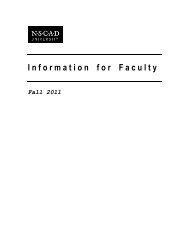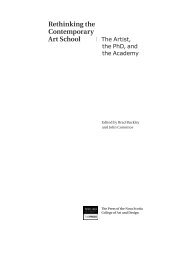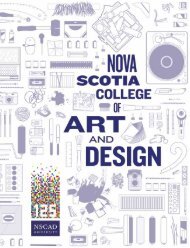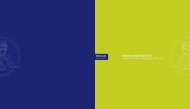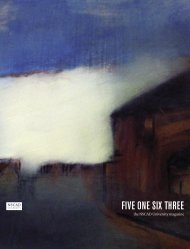CONTENTS - Nova Scotia College of Art and Design
CONTENTS - Nova Scotia College of Art and Design
CONTENTS - Nova Scotia College of Art and Design
Create successful ePaper yourself
Turn your PDF publications into a flip-book with our unique Google optimized e-Paper software.
RESIDENCY REQUIREMENT<br />
The Residency Requirement defines the number <strong>of</strong> credits a<br />
student must complete at NSCAD in order to obtain an undergraduate<br />
degree from NSCAD. The <strong>Nova</strong> <strong>Scotia</strong> <strong>College</strong> <strong>of</strong> <strong>Art</strong> <strong>and</strong><br />
<strong>Design</strong> requires that:<br />
At least 45 credits be completed through courses <strong>of</strong>fered by<br />
NSCAD<br />
A student must complete a minimum <strong>of</strong> 30 credits at NSCAD<br />
after being admitted to a Major program<br />
A student must complete a minimum <strong>of</strong> half the requirements<br />
<strong>of</strong> the chosen Major or Minor at NSCAD.<br />
Non-Resident Credit<br />
The number <strong>of</strong> non-resident credits a student may apply toward<br />
a degree program at NSCAD is governed by NSCAD’s Residency<br />
Requirement. Credits that are transferred toward NSCAD’s<br />
programs as non-resident credits include Off Campus Study<br />
or Exchange Study, Transfer credits from other institutions, or<br />
credits completed on a letter <strong>of</strong> permission at a local or non-local<br />
university. Seventy-five (75) credits is the maximum number <strong>of</strong><br />
non-resident credits a student may apply toward an undergraduate<br />
degree at NSCAD.<br />
SEMESTER STRUCTURE AND SEMESTER CREDIT<br />
NSCAD operates under a semester structure where two semesters<br />
are <strong>of</strong>fered between September <strong>and</strong> April. A third summer<br />
semester is <strong>of</strong>fered between May <strong>and</strong> August. Each semester is 14<br />
teaching weeks in length, but the summer semester is also divided<br />
into two, 7-week sessions.<br />
NSCAD <strong>of</strong>fers courses with varying credit weights <strong>of</strong> 3, 6, or 9<br />
credits. Liberal arts <strong>and</strong> science courses are normally <strong>of</strong>fered for<br />
3 credits. Studio courses may vary between 3, 6, or 9 credits. A<br />
full semester course load is considered to be 15 credits. Normally,<br />
undergraduate students are expected to complete 30 credits in<br />
two semesters per year, so that they may finish an undergraduate<br />
degree program <strong>of</strong> 120 semester credits in four years.<br />
An overload <strong>of</strong> 18 credits in a semester may only be taken (once)<br />
by a student in one <strong>of</strong> his/her final two semesters prior to graduation,<br />
<strong>and</strong> only after an Application to Graduate is submitted. The<br />
student should indicate at the time <strong>of</strong> submission which semester<br />
the overload is required for.<br />
STUDENT USE OF UNIVERSITY FACILITIES<br />
All students, faculty <strong>and</strong> staff <strong>of</strong> NSCAD University are entitled to<br />
the right to use <strong>and</strong> enjoy the properties <strong>and</strong> facilities <strong>of</strong> NSCAD,<br />
including service areas, hallways, other shared spaces, lockers, <strong>and</strong><br />
assigned studio spaces.<br />
In accepting admission to NSCAD, students accept responsibility<br />
for the proper use <strong>and</strong> care <strong>of</strong> NSCAD facilities to which they<br />
are provided access. NSCAD University does not accept any<br />
responsibility for loss or damage to personal property or university<br />
property for which students, staff or faculty have assumed<br />
responsibility.<br />
It is unacceptable to behave in a way which compromises the basic<br />
rights <strong>of</strong> other members <strong>of</strong> NSCAD community. This includes<br />
theft, defacement or damage to university property, or to the<br />
property <strong>of</strong> faculty, staff or students <strong>of</strong> NSCAD. All thefts, defacement<br />
<strong>and</strong> damages should be reported promptly to the Dean.<br />
Studio spaces assigned to students are to be used <strong>and</strong> maintained<br />
according to legally established Fire <strong>and</strong> Safety Codes, <strong>and</strong> to<br />
st<strong>and</strong>ards established by the Manager <strong>of</strong> Buildings <strong>and</strong> Grounds.<br />
Alterations to studio spaces, including establishing temporary<br />
walls, drilling large holes, or suspending materials from the ceiling<br />
require prior approval by the Director <strong>of</strong> Facilities <strong>and</strong> Services.<br />
10<br />
Requests for such approval are to be made in writing. At the end<br />
<strong>of</strong> each semester, studio spaces must be returned to acceptable<br />
condition by the students to whom they are allocated.<br />
Students will be charged with the cost <strong>of</strong> restoring to proper condition<br />
any NSCAD property (including studio space) that, through<br />
their negligence or misuse, has been defaced or damaged. Costs,<br />
including labour, will be assessed by the Director <strong>of</strong> Facilities <strong>and</strong><br />
Services, <strong>and</strong> will appear as a debt to NSCAD on the student’s<br />
account.<br />
Students responsible for theft, defacement or damage to NSCAD<br />
property may have their access to university facilities suspended<br />
They may be subject to disciplinary action by the President’s<br />
Advisory Committee on Disciplinary Matters, as outlined in the<br />
statement on Student Conduct if said theft, defacement or damage<br />
is found to have been intentional or caused as a result <strong>of</strong> improper<br />
behavior. Members <strong>of</strong> the President’s Advisory Committee<br />
on Disciplinary Matters will include the Provost <strong>and</strong> Vice President<br />
(Academic), the Dean, <strong>and</strong> two Division Chairs appointed by the<br />
Vice President (Academic).<br />
TRANSCRIPTS<br />
Students will, upon submission <strong>of</strong> a signed authorized request,<br />
have the right to receive transcripts <strong>of</strong> their own academic record.<br />
Transcripts or grade reports will not be released to third parties<br />
without the prior written approval <strong>of</strong> the student <strong>and</strong> payment <strong>of</strong><br />
the appropriate fee. In cases where students have outst<strong>and</strong>ing accounts<br />
either with NSCAD’s Office <strong>of</strong> Financial Services, the financial<br />
aid program, or the Library (including NOVANET), NSCAD will<br />
not release <strong>of</strong>ficial transcripts, confirmations, or other documentation,<br />
regardless <strong>of</strong> the urgency <strong>of</strong> the need for such. Transcripts<br />
<strong>of</strong> educational records contain only information about academic<br />
status; disciplinary action that affects a student’s academic status<br />
is likewise recorded on the transcript.<br />
Withdrawal <strong>and</strong> Drop Grades Recorded on Student Record<br />
All grades are recorded on the student’s <strong>of</strong>ficial transcript. Course<br />
withdrawals are recorded on the transcript according to the annual<br />
add/drop dates posted on the NSCAD website annually.<br />
WITHDRAWAL PROCEDURES<br />
Students withdrawing from classes should meet with an academic<br />
advisor in the Office <strong>of</strong> Student <strong>and</strong> Academic Services to complete<br />
a Withdrawal Form obtained from the Office <strong>of</strong> Student <strong>and</strong><br />
Academic Services. Not attending classes does not constitute<br />
Withdrawal.<br />
Once a student has finalized her/his registration (by payment <strong>of</strong><br />
the admissions commitment fee for new students, s/he will not be<br />
considered to be withdrawn until the Withdrawal Form or other<br />
written withdrawal request has been submitted. If a student does<br />
not formally withdraw from NSCAD, the student will be charged<br />
full tuition fees <strong>and</strong> other applicable charges.<br />
Withdrawal from a semester is effective the date written notification<br />
is received in the Office <strong>of</strong> Student <strong>and</strong> Academic Services.<br />
The Office <strong>of</strong> Financial Services will be notified by the Office <strong>of</strong><br />
Student <strong>and</strong> Academic Services. Until <strong>of</strong>ficial written notification<br />
is received by NSCAD, students are ineligible for any refund <strong>of</strong><br />
fees or exemption from unpaid fees. If the student’s withdrawal<br />
will result in a refund, the student must apply for the refund at the<br />
time <strong>of</strong> her/his change in registration status.<br />
Non-attendance does not constitute <strong>of</strong>ficial withdrawal <strong>and</strong> will<br />
result in a student receiving a Fail grade <strong>and</strong> being ineligible for<br />
any refund <strong>of</strong> fees or exemption from unpaid fees.<br />
• Students should note that financial withdrawal dates (<strong>and</strong><br />
subsequent charges) are different from academic withdrawal<br />
dates. Please consult the Academic Calendar <strong>of</strong> Dates on the<br />
NSCAD website.


